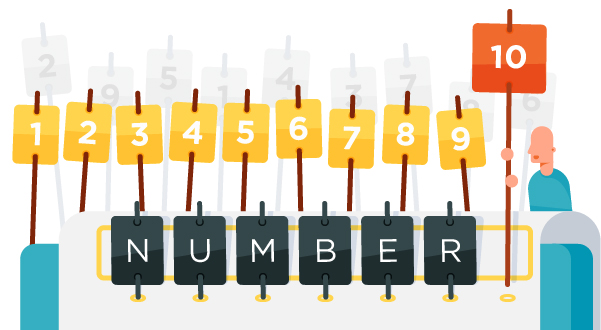How to Write the Best DevOps Headlines & Titles Based on Scientific Research on More Than One Billion Articles

Do you know which words or how many words drive the best results for DevOps content marketing headlines and titles?
Let’s take a look at what research on more than Two billion articles, eye tracking studies, and user experience research found drives the best results for DevOps headlines and titles.
The Best 15 Words to Use in Titles
I gathered more than two billion of the most shared articles for the past twelve months on LinkedIn, Twitter, Facebook, and Google+. I then analyzed the titles of those articles to determine which words were shared most often. Here are the fifteen most shared words in titles:
1. Numbers & Lists

Titles with numbers were by far the most shared with almost two billion shares of articles with titles including a number.
“10” is the most shared number, with 26% of all articles shared that included a number in the title having the number “10.” Another interesting finding was that titles using the number “10” were shared eleven times more that articles using the word “ten.”
A similar study analyzing a million blog headlines found that list posts using the number “10” were shared four times as much as the second most popular list number of “23.” In third and fourth place were 16 and 24, respectively. The study also found that list posts only made up 5% of the one million articles analyzed.
Examples
- Top 10 DevOps Tools to Look Out for in 2016
- The 10 Most Common Questions IT Admins Ask About Docker
- Agile vs. DevOps: 10 Ways They’re Different
Take Away
- Use list posts in titles often
- When it makes sense, make your list a list of “10”
- Use numerals, not the word for the number
2. You

Titles with the word “you” were the second most shared at slightly more than a billion. We may not like to admit it, but we are self obsessed; the numbers don’t lie.
Examples
- So You Think You Can DevOps?
- DevOps enters the mainstream: Here’s how to make it work for you
- Are you truly DevOps? Find out how your team compares in the 2016 State of DevOps report
Similar Word Ranking
- 1 Billion – You
- 500 million – I
- 300 million – Me
- 200 million – We
- 200 million – Us
Take Away
- Use the word “you” in your titles when it makes sense
3. What

Titles with the word “what” were shared slightly more than 650 million times. Titles with the word “what” combined with the word “is” made up 37% of those 650 million shares.
Shares by Word Combinations
- 37% What is
- 15% What do
- 13% What are
- 9% What did
- 8% What will
- 6% What does
Examples
- What is DevOps?: The Assembly Line
- What DevOps can do for you
- 10 Ways to Win at DevOps: What IT Pros Need to Know
Take Away
- Use the phrase “what is” in titles often to attract attention to your post
4. Will

Titles with the word “will” were shared almost 500 million times. Titles with the word “will” combined with the word “make” made up 21% of those nearly 500 million shares.
Examples
- Why enterprise DevOps will make IT organizations and CIOs relevant
- Shadow IT will make organizations more agile and user centric
- 23 Photos That Will Make Anyone Who Works in IT Satisfied
Take Away
- Use the phrase “will make” in titles often
5. How

Titles with the word “how” were shared slightly more than 450 million times. Unsurprisingly, titles with the phrase “how to” made up 51% of those 450 million shares.
Examples
- How to Boost Your Career with DevOps
- Real-world DevOps failures — and how to avoid them
- DevOps: How to Persuade Your Boss to Buy In
Take Away
- Use the phrase “how to” in titles often
6. New

Titles with the word “new” were shared slightly fewer than 450 million times.
Examples
- Chef’s new Habitat project wants to make applications infrastructure-independent
- 5 New Facebook Features and How Marketers Should Use Them
- Content Marketing Takes a Turn for the Better: New 2017 Research
Take Away
- Use the word “new” in titles often
7. Why

Titles with the word “why” were shared slightly more than 300 million times.
Examples
- Why Uber Engineering Switched from Postgres to MySQL
- DevOps: Why People (Not Tools) Are Transforming Software Development
- Why are we racing to DevOps?
Take Away
- Use the word “why” in titles often
8. Best

Titles with the word “best” were shared slightly fewer than 300 million times. Titles with the phrase “best (blank)” made up 89% of those nearly 300 million shares.
Shares by Word Combinations
- 89% Best (Blank)
- 54% The best
- 5% Best way
- 2% How best
Similar Word Ranking
- 300 million – Best
- 200 million – Top
- 100 million – Better
- 90 million – Fast(est)
- 80 million – Easy(iest)
- 60 million – Simple
- 60 million – Worst
- 20 million – Quick(est)
Examples
- DevOps tools best practices: A 7-step guide
- Getting to DevSecOps: 5 best practices for integrating security into your DevOps
- Best DevOps strategies to ensure success in the cloud
Take Away
- Use the phrase “best (blank)” in titles often
9. Science

Titles with the word “science” were shared slightly fewer than 300 million times.
Similar Word Ranking
- 300 million – Science
- 300 million – Data
- 30 million – Research
- 7 million – Stats
- 5 million – Statistics
Examples
- The Science of DevOps Decoded — Smarter with Gartner
- How DevOps Can Use Operational Data Science to See into the Cloud
- What We Learned from Three Years of Sciencing the Crap Out of DevOps
Take Away
- Use words that demonstrate a scientific approach in your titles often
10. Should

Titles with the word “should” were shared slightly more than 200 million times. Titles with the words “should” and “you” made up 53% of those 200 million shares.
Examples
- 3 Capabilities Needed for DevOps that You Should Already Have in Your Cloud Organization
- Why You Should Combine the Best of ITIL and DevOps
- Devs love containers — and ops should, too
Take Away
- Use the words “should” and “you” in titles often
11. Know

Titles with the word “know” were shared slightly more than 200 million times. Titles with the words “know” and “you” made up 68% of those 200 million shares.
Examples
- 25 DevOps Vendors You Need to Know
- 10 Things You Should Know About DevOps at InterConnect 2016
- What You Need to Know About DevOps
Take Away
- Use the words “know” and “you” in titles often
12. Vs

Titles with the abbreviation “vs” were shared slightly fewer than 200 million times. On the other hand, the fully spelled out word “versus” received fewer than ten million shares.
Examples
- ITIL® vs. DevOps! 25 Influential Expert Insights
- Agile vs. DevOps: 10 Ways They’re Different
- A Pile of Scripts vs. PaaS — Operations Teams Can Step Up & Be Strategic
Take Away
- Use the abbreviation “vs” in titles often
- Do not spell out the full word
13. Never

Titles with the word “never” were shared slightly more than 150 million times.
Examples
- Security and DevOps are Never 100% Done
- Why Successful People Never Bring Smartphones into Meetings
- The One Thing Successful People Never Do
Take Away
- Use the word “never” in titles often
14. Free

People say that “free” is the most powerful word in selling. As titles go, “free” is the fourteenth most powerful word in selling. Titles with the word “free” were shared slightly more than 150 million times.
Examples
- 400+ Free Resources for DevOps & SysAdmins
- Free eBook: Building Cloud Apps with Microsoft Azure
- 101 Free Things to Do with Kids in Michigan
Take Away
- Use the word “free” in titles often
15. Stop

Titles with the word “stop” were shared slightly more than 150 million times.
Examples
- Stop hiring for “DevOps”; start hiring for Culture
- Can We Stop Talking about DevOps?
- Happy mode, sad mode, DevOps mode: Stop worrying and go bimodal
Take Away
- Use the word “stop” in titles when possible
How Many Words Should You Use in Titles?

Do you know how many words you should use in your titles? While there isn’t a perfect answer, eye tracking studies, user experience research, data analysis, and character limits provide guidelines you can follow to craft the perfect headline. Here’s how you can determine the perfect number of words for your titles.
On average, people give a headline less than a second to grab their attention. Eye tracking studies from The Poynter Institute and user experience research from KISSmetrics show that people tend to scan headlines. When people scan headlines they only read the first three words of a headline, so you have to make sure those first three words instantly grab their attention if you want them to pay attention to the rest of the headline.

Interestingly enough, the research also found that if the first three words grab someone’s attention, their eyes tend to skip to the last three words, so you have to make sure those last three words close the deal and get people to consider clicking your headline.
The eye tracking studies and user experience research could lead you to think that headlines should optimally be six words, but websites like Buzzfeed and Upworthy owe much of their success to the use of long titles that are on average 15 to 28 words long. Neuroscientists at Nielsen Neuro found that longer headlines drive more engagement. Specifically, they found that 21 to 28 word headlines drove the highest engagement.

If trying to optimize human behavior isn’t challenging enough, then you’re in luck, because you also need to consider constraints when choosing the length of your title. The first constraint is Twitter. Your headline should be 89 characters or fewer if you value clicks from Twitter. Eighty-nine characters leaves enough room to have a shortened URL and image in your tweet and a space between the URL and headline.
The next bar is Google. Your headline should be fewer than 55 characters to fit in Google search rankings. If your title is longer than 55 characters, you should ensure that the first 55 are descriptive enough to motivate people to click or make the title tag different from the main headline.
Don’t let character limits from Google and social channels keep you from creating titles that will get you the best results. You can easily make your titles different for each social media channel using different titles in the meta tags that are unique to each social media tool.
Take Away
- The first 3 words are the most important
- The last 3 words are the next most important
- Longer titles drive the most engagement
- Titles need to be 117 characters or fewer to fit in a tweet
- Google limits headlines to 55 characters or fewer
- You can create different titles for different channels
How to Write the Perfect Title

Writing great titles is like being a great NBA three-point shooter. You have to take a ton of pre-game practice shots to hit the game-winning three-pointer. Upworthy writers create 25 titles as quickly as possible for each article they create. It was an exercise that originated from another news site known for attention-grabbing headlines, The Onion.
The purpose isn’t to create 25 amazing titles; the purpose is to create the widest variations of a title. Adam Mordecai, Upworthy Editor-at-Large, says:
“The reason it’s always 25, no less, is that it forces you to think waaaay outside the box when writing. You get desperate around headline 21, and do something so out of left field that it’s not the typical headline.”
– Adam Mordecai, Upworthy Editor-at-Large
Advertising legend David Ogilvy rewrote one of his famous headlines for an automobile advertisement 104 times.
“At 60 miles an hour, the only thing you hear in the new Rolls Royce is the ticking of the dashboard clock …”
I like to use the Upworthy practice of quickly writing 25 headlines and then write up to 15 more, making sure I have tried at least one variation using each of the most shared title words. Below you can see 15 variations that could be used for this article:
- What Are the Best Words You Can Use in Headlines?
- 15 Words That Will Make Your Headlines Better
- How to Write the Best Headlines
- Why Some Headlines Do Better than Others
- The 15 Best Words You Can Use in Your Headlines
- New Research Finds the 15 Best Words You Can Use in Headlines
- The Science Behind Writing Headlines
- Here Are the 15 Best Words for Titles that You Should Know
- Best Headlines vs. Worst Headlines
- Never Forget These 15 Words for Headlines
- 15 Free Ways to Improve Your Content Marketing
- Stop Leaving These 15 Words Out of Your Headlines
Then I like to choose the one that I feel will drive the most traffic and crank out at least 10 variations of that to see if there is an even better variation. In this example, I chose “How to Write the Best Headlines.”
While creating these variations, I use Google Adwords’ Keyword Tool and BuzzSumo to see how different variations of individual words perform. For example, you can see that I was originally using the word “headlines” in my titles for this article but then I saw that the word “titles” does much better.
“Headline generator” is the top Google keyword related to my article. Using the word “headline” generates 2,400 searches a month.

I compared that to the top Google keyword related to my article which was “title” and found that “title generator” received 14,800 searches a month. That is more than six times as many searches for “title generator” than “headline generator.”

As you know, my article is not about title generators, but that is the highest-ranking keyword that relates to this article. Lower-ranking keywords showed the same trend, demonstrating that more related searches are done including the word “title” than “headline.”
I then did a similar search in BuzzSumo and found supporting trends for social shares. Hubspot had an article that included the word “titles” which got the most shares over the last twelve months at 14,900 shares.

On the other hand, the most shared article using the word “headlines” only received 2,700 shares. This article happens to be from Hubspot as well, so I felt pretty confident that I should use the word “titles” over “headlines.”

Conclusion
While the research provided in this section will help you create better titles, my hope is that it also inspires you to do you own research and testing to determine the best words and character count for your own audience.
But mostly I hope that it has inspired you to invest more time in titling your content. You invest too much time and energy in creating content to let it fall short of its full potential because you cut corners on the title!
